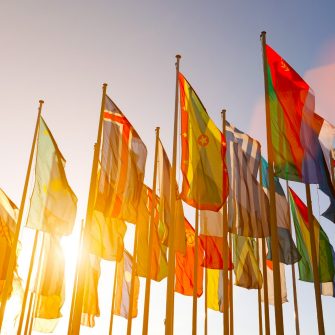Open your career possibilities

Set yourself apart with a degree from UNSW Law & Justice.
Ranked 12th in the world by the 2024 QS World Rankings by Subject, UNSW Law & Justice has been a leader in Australian legal education for more than 50 years. Join a community with a commitment to excellence, driven by a pursuit of justice for all. Through our postgraduate programs, you’ll gain the skills, perspectives and connections to achieve your career ambitions.
Our programs
Master of Laws specialisations
-
Acquire advanced knowledge and analytical ability across a range of contemporary issues such as:
the development of international trade and investment rules and policy
the settlement of trade and investment disputes
technological developments and regulations (such as the regulation of digital financial services and e-commerce).
Find out more
-
Gain legal knowledge in a practical commercial and regulatory context to expand your expertise in new areas of study or explore existing knowledge at a deeper level. You'll gain from this specialisation:
Cutting-edge knowledge in corporate, commercial and tax law.
Interdisciplinary knowledge across law and business.
Command of traditional and emerging areas in this fast-changing field.
Find out more
-
Research and analyse current debates, emerging problems, and new criminal law and criminal justice developments. You'll gain from this specialisation:
A deeper understanding of the criminal justice system.
The capacity to critically examine criminal justice practices and institutions, including through a comparative perspective.
The capacity to understand and apply relevant theories or doctrines to analysing problems or debates in criminal law, criminal procedure or criminal justice.
Enhanced skills in legal and criminological research and in communicating complex ideas effectively.
Find out more
-
Explore a broad range of dispute resolution processes that occur outside the courts. You'll gain from this specialisation:
An opportunity to scrutinise and build skills in processes on the alternative dispute resolution (ADR) continuum.
An engagement in practical exercises designed to build a deeper understanding of the most commonly encountered non-litigious dispute resolution processes in which lawyers and non-lawyers engage.
An exploration of the legislative and commercial regimes that promote effective dispute resolution.
Some understanding of the international experience of dispute resolution.
Find out more
-
Gain a strong theoretical and practical understanding of the environmental legal system, frameworks and tools for sustainable environmental management, and the complex policy issues presented by the environmental challenges of the 21st century. You'll gain from this specialisation:
- Deep understanding of the leading legal concepts and principles governing the protection of the environment and sustainable development.
- Understanding and appreciation of the different methods applied at international and national levels in formulating environmental law, and the mechanisms for enforcement and compliance in environmental law.
- Awareness and understanding of the challenges posed by the sectoral applications of environmental law and policy, including opportunities to explore the creative use of private and commercial law in pursuit of environmental goals.
- The opportunity to complement legal approaches with direct study of environmental management and policy approaches in the UNSW Faculty of Arts, Design & Architecture.
- High-achieving students may develop a research interest throughout their master's studies to form a PhD research proposal.
Find out more
-
Acquire expertise in human rights law and the policy context that it operates in with human rights academics and practitioners across various human rights issues. You'll gain from this specialisation:
Specialised knowledge of international human rights law theory and doctrine and its appropriate application in various settings.
Enhanced skills of legal problem-solving, critical reflection about international human rights laws, analysis of human rights legal texts and documents, and an ability to make informed judgments about their application to current events and legal disputes.
Experience in undertaking scholarly research on any issue of international human rights law of your choosing.
Increased understanding of the role of international human rights law and the institutions they are mediated through.
Find out more
-
Draw on the excellence offered by UNSW Law & Justice's academic staff, visiting lecturers and presenters who advise governments, the United Nations and other international organisations on a range of legal issues. You'll gain from this specialisation:
Solid command of the language and toolbox of international law.
A better understanding of how international law permeates everyday life.
Ability to understand the complex and ever-changing institutional landscape where international law is created, applied and projected onto the rest of the world.
Ability to command at least one specialised subfield of international law.
Find out more
-
Develop a theoretical and practical understanding of the different laws and regulatory issues that can arise in the context of new and old media, intellectual property and technology law. You'll gain from this specialisation:
Solid command of the language and principles of media and communications law, intellectual property law, and/or technology law.
Improved understanding of how media law, intellectual property law and technology law impact upon everyday life and regulate commercial activities, and the restrictions and opportunities created by these laws.
Ability to understand the ever-changing Australian and international institutional contexts in which media and communications law, intellectual property law, and/or technology law are created and applied.
Ability to command at least one specialised subfield of media and communications law, intellectual property law, and/or technology law.
Find out more
How to become a lawyer
Discover the path to practice that’s right for you with UNSW Law & Justice’s end-to-end legal education. We’ve broken down the steps you can take to become a practising lawyer in Australia or overseas, no matter which path you choose to take.
The UNSW Law & Justice difference
Supporting Aboriginal and Torres Strait Islander students
We’re committed to increasing the number of Indigenous Law & Justice graduates and launching their world-changing careers. For more than 40 years, we have been working in partnership with Nura Gili Centre for Indigenous Programs to deliver pathway and enabling programs for Aboriginal and Torres Strait Islander students.
Scholarships
Reach your full potential with our range of faculty and university-wide scholarships. Available for domestic and international students across our postgraduate programs, our awards and grants reward excellence, and encourage international mobility, diversity and equity.











